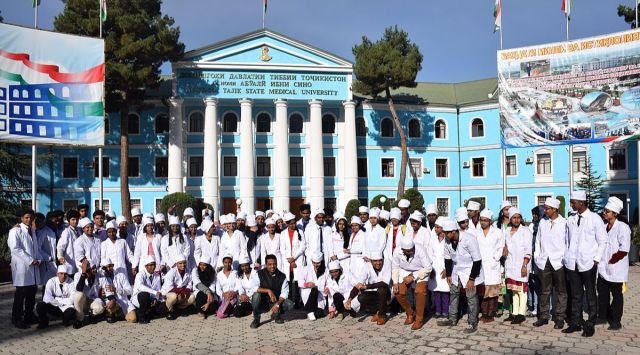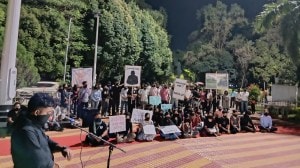NEET UG 2023: MBBS from Russia – check eligibility, fees, colleges, scholarships
Eligibility criteria, course structure, list of colleges and fees, how to apply, medium of teaching - check what it requires to pursue MBBS from Russia.
 Studying in Russia - check eligibility, tuition, colleges, scholarships. (Representative image. Source: Wikimedia Commons)
Studying in Russia - check eligibility, tuition, colleges, scholarships. (Representative image. Source: Wikimedia Commons) NEET UG 2023: Russia is one of the most popular study abroad destinations for Indian medical students. According to the data provided by the Indian government, there were 18,039 Indian students in Russia in 2022. While the Ministry of External Affairs does not maintain any data on for which course the students have applied for, according to the data provided by the NBE, 4515 students appeared for the Foreign Medical Graduate Examination (FMGE) and 1119 candidates cleared the screening test in 2021.
Considering that Russia is such a popular destination among medical aspirants, here are some of the key things to know:
Official government website
studyinrussia.ru/en/study-in-russia/medical-education-in-russia/
Eligibility
— At least 50% aggregate score in PCB subjects in class 12
— NEET qualified (50 percentiler)
— Medical clearance against any contagious diseases.
— The minimum age requirement is 17 years.
Course structure
An MBBS degree is a journey of 6 years in Russia, of which five years are dedicated to academic study and the final year is for internship. Also, as a rule, it goes on as a separate form of education — specialist programmes. The exceptions are the dentistry and pharmacy specialties lasting five years and nursing – four years.
The first three years focus mainly on the theoretical part and the latter three years concentrate on the practical side of the training. Each year is divided into two semesters, making it 12 semesters in total.
After completing four-years-undergraduate programmes, students receive a bachelor’s degree and a diploma of higher education. After that, students can continue their studies and take a Master programme.
The academic session usually begins between September and October in Russia.
Admission process
There is no entrance exam to get admission in MBBS courses in Russia. Students have to visit the website of the university/institute they are interested in, and fill the application form of that varsity. After that, they will be asked to submit all the required documents as proof of their identity and educational qualifications.
Once all the information is cross checked by the authorities, the university will reach out to the student personally through email, if selected.
Scholarships
To get a scholarship to study in Russia, candidates will have to take tests, interviews, and academic competitions depending on the university and country. After that, the candidates will undergo competitive selection, and the selected candidates will find their names in the list of candidates on the sites or the representation of Rossotrudnichestvo or Russian Embassy.
Aspirants should remember that they will have to clear the Unified State Examination (EGE) or pass admission tests.
The government scholarships cover free tuition for the entire duration of the chosen programme, maintenance allowance (for the entire duration of study regardless of the candidate’s success). In 2020, an average scholarship amounted to 1,484 roubles a month (approximately $22), and dormitory accommodation (if available). However, it does not cover travel costs and living expenses.
Tuition fees
Training in the full-time department of the Bachelor’s degree costs approximately 240-260 thousand rubles* ($ 3,430-3,715) per year. The minimum cost is 122 500 rubles ($ 1,750) per year; the maximum – 880 000 rubles ($ 12,570) per year.
Specialist’s degree is awarded after at least five years of training. It has more of a practical focus in comparison to a Bachelor. The cost of training on the full-time department of the Specialist’s degree is about 240-260 thousand rubles* ($ 3,430-3,715) per year on average. The minimum cost is 122,5 thousand rubles ($ 1,750) per year. The maximum is 632 580 rubles ($ 9,036) per year.
Recognised colleges
There are about 70 universities in Russia that train doctors, both specialised medical educational organisations, and special medical faculties in universities with a wide range of educational profiles.
Some of the most popular MBBS colleges in Russia, according to the FMGE candidates data provided by the NBE are Tver State Medical University, Stavropol State Medical University, Volgograd State Medical University, Smolensk State Medical University, Kazan State Medical University, Kursk State Medical University, Northern State Medical University, Penza State University Medical Institute, Belgorod National Research University Medical Institute, Medical Institute of Tambov State University Named After G. R. Derzhavin, among others.
Medium of teaching
Usually, MBSS is taught in English in Russia. However, there are a few institutes that teach the course in Russian. The international students are also taught the Russian language along with their medical studies, to ensure smooth transition from English to Russian in the later stages of the course, if needed.
- 01
- 02
- 03
- 04
- 05































